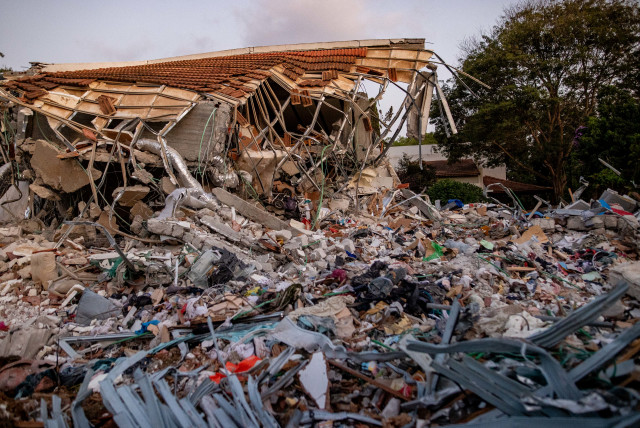Alon Schuster: Israel must pay a price in security to bring hostages home

The Jerusalem Post Podcast with Tamar Uriel-Beeri and Sarah Ben-Nun.
Israel will need to pay a price in terms of security in the South in order to achieve a hostage deal to bring the hostages home from Gaza, National Unity MK Alon Schuster told Sarah Ben-Nun on The Jerusalem Post Podcast.
Schuster has been linked to the South his entire life. Born and still living in Kibbutz Mefalsim in the Gaza border area two South American immigrants, he worked in the kibbutz for decades. Then, for 16 years (from 2002-2018), he served as the head of the Shaar Hanegev Regional Council. As such, he is intimately familiar with the security challenges in the South throughout the decades.
"The history of Shaar Hanegev and Gaza from '48 to '56... was a time of feyadeen - guerrilla - attacks from Gaza to the [nearby] communities," Schuster explained. However, after the IDF operation in the Sinai Peninsula in 1956, there was more or less quiet in the region for 45 years, with the Six Day War as the sole exception.
"But since spring of 2011, when they launched shells into Kibbutz Nahal Oz and they started to attack with [with rockets] Sderot and other places... it has been 20-23 years where they shoot us with rockets, snipers, and anti-tank missiles against armored cars and school buses. And there's the old project of underground tunnels trying to infiltrate into Israel."
Schuster and others like him made strides to shore up the security in the South, which led people to move to Sderot and nearby towns before the war.
"For two decades, we made a lot of efforts, and a lot of successful efforts, in order to give... a sense of security to the inhabitants [of the southern communities]," he explained, touting the success of building protected buildings for schools, safe rooms, the Iron Dome, and even some defense measures against underground tunnels.
But on October 7, the communities were taken off guard.
While Schuster said the situation couldn't be accurately described as the state abandoning the communities of the South, it could be described as a catastrophic intelligence failure and a failure in protecting the residents of the South.
"On October 6, most people felt it was rational to live so close to the border," he explained. But today, even though Israel has dealt severe blows to Hamas and Palestinian Islamic Jihad, "many people are feeling more unprotected than before. They lost a lot of their faith in the IDF, they know exactly what happened in the Kfar Aza and other kibbutzim. When they went out of [our] kibbutz on Saturday night or Sunday morning, they saw dozes of bodies and burned cars so close to their home."
Most people left the community after October 7, and few have returned so far. While Schuster thinks 60%-70% will return in the coming weeks, 20%-30% of residents won't come back next month, and some won't come back at all.
"We have to prepare ourselves for a great demographic challenge," Schuster explained, noting they would have to essentially start from scratch in many respects.
"Our main goal is [the revival] of the communities here."
The need for a ceasefire
Schuster further stressed the importance for a ceasefire deal, and for numerous reasons.
First, there is the importance of getting hostages back.
Secondly, this could allow Israel to focus its attention away from Gaza and instead on the war that could break out against Hezbollah.
However, it doesn't seem a hostage deal and ceasefire will be happening soon.
"I heard that [Prime Minister Benjamin Netanyahu] wants the hostages back home," Schuster said, but noting that too much political interference entered the negotiations. Netanyahu "is not willing to risk the stability of his government by making unpopular decisions."
This unpopular decision was specifically the hostage deal outline endorsed by US President Joe Biden.
"This is the main issue. I don't think [Netanyahu] wants my neighbors and friends to stay dead or alive in Gaza, but he's not willing to pay the political price," Schuster noted. "There are other kinds of prices that we will have to pay in order to bring them back immediately. And we should do it, because unless we do, the soul of Israel will not recover."
This includes a price to be payed in terms security.
"We don't have time to reach the best security situation for us," he concluded. "Because we have to bring our friends, neighbors, family, and people back home."
Jerusalem Post Store
`; document.getElementById("linkPremium").innerHTML = cont; var divWithLink = document.getElementById("premium-link"); if (divWithLink !== null && divWithLink !== 'undefined') { divWithLink.style.border = "solid 1px #cb0f3e"; divWithLink.style.textAlign = "center"; divWithLink.style.marginBottom = "15px"; divWithLink.style.marginTop = "15px"; divWithLink.style.width = "100%"; divWithLink.style.backgroundColor = "#122952"; divWithLink.style.color = "#ffffff"; divWithLink.style.lineHeight = "1.5"; } } (function (v, i) { });

